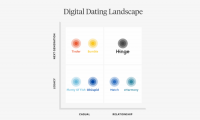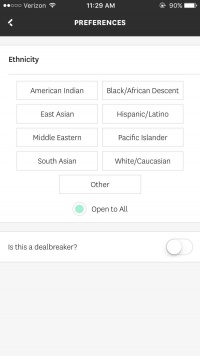Difference between revisions of "Hinge"
| Line 3: | Line 3: | ||
==History== | ==History== | ||
| − | [[File:HINGE.png| | + | [[File:HINGE.png|200px|right|Dating app matrix. Source: Hinge]] |
Justin McLeod, Hinge's founder, and CEO founded Hinge in 2012. <ref>Shontell, Alyson. “A Dying Dating App Blew Its Last $25,000 On A Hail Mary - Now It's On Fire, Giving Tinder A Run For Its Money.” Business Insider, Business Insider, 22 Oct. 2014, www.businessinsider.com/meet-hinge-and-its-founder-justin-mcleod-2014-10. | Justin McLeod, Hinge's founder, and CEO founded Hinge in 2012. <ref>Shontell, Alyson. “A Dying Dating App Blew Its Last $25,000 On A Hail Mary - Now It's On Fire, Giving Tinder A Run For Its Money.” Business Insider, Business Insider, 22 Oct. 2014, www.businessinsider.com/meet-hinge-and-its-founder-justin-mcleod-2014-10. | ||
</ref> However, the application has gone through several iterations since its first launch. Originally, the application was similar to Tinder’s model by allowing users to swipe through profiles to seek matches. <ref name="Dale" /> In Hinge’s initial launch, their unique approach to only match users with friends of friends on Facebook set them apart. <ref name="Flynn">Flynn, Kerry. “Dating App Hinge Relaunches, Making Serious Moves Away from Tinder.” Mashable, Mashable, 11 Oct. 2016, mashable.com/2016/10/11/hinge-relaunch/. | </ref> However, the application has gone through several iterations since its first launch. Originally, the application was similar to Tinder’s model by allowing users to swipe through profiles to seek matches. <ref name="Dale" /> In Hinge’s initial launch, their unique approach to only match users with friends of friends on Facebook set them apart. <ref name="Flynn">Flynn, Kerry. “Dating App Hinge Relaunches, Making Serious Moves Away from Tinder.” Mashable, Mashable, 11 Oct. 2016, mashable.com/2016/10/11/hinge-relaunch/. | ||
| Line 40: | Line 40: | ||
===Enabling users to discriminate by ethnicity and religion=== | ===Enabling users to discriminate by ethnicity and religion=== | ||
| − | [[File: | + | [[File:hingeapp.jpg|200px|right|Source: Hinge]] |
Hinge allows all users to set preferences for age range and distance for other users, which is standard in the dating-app sphere. A unique feature, while only available for premium members, allows users to filter what types of users are shown to them based on height, ethnicity, and religion. <ref name="hannah"> Smothers, Hannah. “This Controversial New Dating App Feature Allows You to Choose Which Ethnicities You See.” Cosmopolitan, Cosmopolitan, 9 Oct. 2017, www.cosmopolitan.com/sex-love/a7204682/hinge-ethnicity-preference/.</ref> Users can either list these as preferences, or ‘dealbreakers’ in which case they won’t be shown anyone outside of this criteria. <ref name="hannah" /> This feature has been controversial and criticized for enabling racism on the app. <ref name="hannah" /> | Hinge allows all users to set preferences for age range and distance for other users, which is standard in the dating-app sphere. A unique feature, while only available for premium members, allows users to filter what types of users are shown to them based on height, ethnicity, and religion. <ref name="hannah"> Smothers, Hannah. “This Controversial New Dating App Feature Allows You to Choose Which Ethnicities You See.” Cosmopolitan, Cosmopolitan, 9 Oct. 2017, www.cosmopolitan.com/sex-love/a7204682/hinge-ethnicity-preference/.</ref> Users can either list these as preferences, or ‘dealbreakers’ in which case they won’t be shown anyone outside of this criteria. <ref name="hannah" /> This feature has been controversial and criticized for enabling racism on the app. <ref name="hannah" /> | ||
==References== | ==References== | ||
Revision as of 00:22, 12 March 2021
Hinge is a location-based mobile dating application with a freemium model that enables users to scroll through other users’ profiles and send them a ‘like’ to let other users know they would like to ‘match’ with them. Hinge has coined itself as “the relationship app” [1] and has advertised the application as “designed to be deleted.” [2] Hinge uses eight design principles that are meant to support genuine interaction between users, such as requiring users to answer three prompts to add to their profile, encouraging users to share their religion and political affiliation, and only allowing free users to send ten likes per day. [2] Asking users to share personal information such as their political views, religious beliefs, and education is meant to help better connect users with good matches. However, with this increase in personal information shared comes a cost; users put themselves at risk for privacy breaches with sensitive information.
Contents
History
Justin McLeod, Hinge's founder, and CEO founded Hinge in 2012. [3] However, the application has gone through several iterations since its first launch. Originally, the application was similar to Tinder’s model by allowing users to swipe through profiles to seek matches. [1] In Hinge’s initial launch, their unique approach to only match users with friends of friends on Facebook set them apart. [4] Soon after, competitors adopted the same feature.
In September 2015, Vanity Fair published “Tinder and the Dawn of the Dating Apocalypse” which went viral for criticizing dating apps for creating a toxic hookup culture without love or romance. [5] McLeod claimed that this article motivated him and his twenty-person team to rethink their approach and to build a dating app that aimed to do things differently. [4]
Redesign
In January 2016, Hinge conducted user research and surveyed its users to gain an understanding of what they wanted out of a dating app. [4] The survey data showed that users already found Hinge to be more relationship-leaning than other apps like Tinder, but 70% of users reported that they’d like a dating app more serious than Hinge. [4]
Later in 2016, Hinge did an entire re-design of their application by moving away from the traditional ‘swiping’ model and created a new design where users scroll through other user’s profiles.[4] This major change, along with other modifications such as removing expirations on matches, created connections that turned into full conversations five times more than the previous version, and users exchanged phone numbers seven times as often. [4] Additionally, Hinge began to charge users $7 a month in an attempt to weed out non-serious users. [6] By 2017, Hinge had reverted back to a freemium model. [6]
Now
The COVID-19 pandemic caused bars, restaurants, and other social outlets to close, which led to a significant spike in dating app interaction. In 2020, Hinge tripled its revenue with 82% growth in downloads. [7]
Ethical Implications
Privacy
Hinge is seemingly open about how it utilizes user data to strengthen its algorithm. Hinge claims to use data to help users match with their perfect partner, and even includes their algorithm as a reason why it’s “designed to be deleted.” [2] The company has its own research team, HingeLabs, that claims to use behavioral data to create more successful interactions between users. [8] McLeod shared in an interview that Hinge’s algorithm “gets better and more accurate the more that you reveal your tastes.” [9] Hinge encourages users to share a lot of personal information about themselves to help them find a match. This includes educational background, occupation, age, and height-- but this information becomes more sensitive in the case of sharing drug habits, location, and preferences or ‘dealbreakers’ in a partner when it comes to their religion or ethnicity. [10] If this type of sensitive information were leaked, it could have detrimental consequences. For instance, admitting to the use of marijuana or other drugs could cost someone their job, or someone’s sexual orientation could be used for blackmailing. Hinge’s privacy policy poses concerning implications for users, stating that “we do not promise, and you should not expect, that your personal information will always remain secure.” [6]
Hinge is owned by Match Group, which has had security breaches in the past. Data from 70,000 OKCupid users that were scraped by researchers in 2016 are still public, and in 2020 more than 70,000 Tinder photos of women were shared online without users’ consent or knowledge. [11] Additionally, Hinge data is accessible and shareable to Match Group’s 45 other companies. [10]
Hinge shares data with third parties; the application’s privacy preferences share 10 third-party marketing tools that enable companies to track user’s activity on the internet. [10] Currently, users can only opt-out of two of them. [10]
Under Hinge’s privacy policy, users agree that under necessary circumstances, user data can be shared with the police. [12] While unlikely, admitting to underage drinking or recreational drug use on Hinge could theoretically incriminate a user.
Using Hinge data to derail sexual assault cases
Hinge also keeps all of the users’ messaging history, which can be used against them. There have been past instances of women coming forward to report that they have been raped or attacked on a date from a dating app, and the courts have used messaging history against them to derail their case if they were shown to be flirting or arranging to meet with the perpetrator. [10]
Hinge can keep user data forever
Hinge’s privacy policy states that they can keep hold of a user’s data forever, even after the user has deleted their account. [12]
Enabling users to discriminate by ethnicity and religion
Hinge allows all users to set preferences for age range and distance for other users, which is standard in the dating-app sphere. A unique feature, while only available for premium members, allows users to filter what types of users are shown to them based on height, ethnicity, and religion. [13] Users can either list these as preferences, or ‘dealbreakers’ in which case they won’t be shown anyone outside of this criteria. [13] This feature has been controversial and criticized for enabling racism on the app. [13]
References
- ↑ 1.0 1.1 Markowitz, Dale. “Hinge's CEO Says a Good Dating App Relies on Vulnerability, Not Algorithms.” The Washington Post, WP Company, 31 Mar. 2019, www.washingtonpost.com/news/soloish/wp/2017/09/29/hinges-ceo-says-vulnerability-not-an-algorithm-is-the-key-to-a-good-dating-app/.
- ↑ 2.0 2.1 2.2 Hinge. “8 Ways We Are Designed to Be Deleted.” Hinge, hinge.co/designed-to-be-deleted.
- ↑ Shontell, Alyson. “A Dying Dating App Blew Its Last $25,000 On A Hail Mary - Now It's On Fire, Giving Tinder A Run For Its Money.” Business Insider, Business Insider, 22 Oct. 2014, www.businessinsider.com/meet-hinge-and-its-founder-justin-mcleod-2014-10.
- ↑ 4.0 4.1 4.2 4.3 4.4 4.5 Flynn, Kerry. “Dating App Hinge Relaunches, Making Serious Moves Away from Tinder.” Mashable, Mashable, 11 Oct. 2016, mashable.com/2016/10/11/hinge-relaunch/.
- ↑ Sales, Nancy Jo, and Photography by Justin Bishop. “Tinder and the Dawn of the Dating Apocalypse.” Vanity Fair, 2015, www.vanityfair.com/culture/2015/08/tinder-hook-up-culture-end-of-dating.
- ↑ 6.0 6.1 6.2 Iovine, Anna. “Hinge's Founder Leans into Data to Set the Dating App Apart from the Pack.” Mashable, Mashable, 2 Dec. 2019, mashable.com/article/hinge-justin-mcleod-interview/.
- ↑ Schafer, Brett. “Could Hinge Be Match Group's Next Tinder?” The Motley Fool, The Motley Fool, 10 Nov. 2020, www.fool.com/investing/2020/11/10/could-hinge-be-match-groups-next-tinder/?source=aw&awc=21748_1615490421_90612bb0a82ad3715e0b0b9484b1e0e7.
- ↑ “Hinge Labs.” Hingelabs.co, www.hingelabs.co/.
- ↑ Maitland, Hayley. “The Founder Of Hinge Has Some Thoughts On Your Dating Profile.” British Vogue, British Vogue, 14 Aug. 2019, www.vogue.co.uk/article/justin-mcleod-hinge-founder-interview-2019.
- ↑ 10.0 10.1 10.2 10.3 10.4 Andrews, Frank. “Five Reasons You Should Delete Hinge.” VICE, 23 Nov. 2020, www.vice.com/en/article/n7vzbm/five-reasons-you-should-delete-hinge.
- ↑ Zimmer, Michael. “OkCupid Study Reveals the Perils of Big-Data Science.” Wired, Conde Nast, 3 June 2017, www.wired.com/2016/05/okcupid-study-reveals-perils-big-data-science/.
- ↑ 12.0 12.1 Hinge. “Privacy.” Hinge, hinge.co/privacy.html.
- ↑ 13.0 13.1 13.2 Smothers, Hannah. “This Controversial New Dating App Feature Allows You to Choose Which Ethnicities You See.” Cosmopolitan, Cosmopolitan, 9 Oct. 2017, www.cosmopolitan.com/sex-love/a7204682/hinge-ethnicity-preference/.

